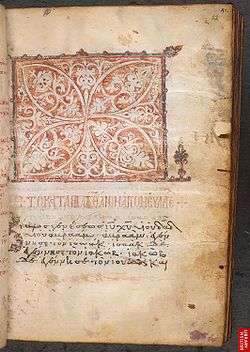Minuscule 485
|
Beginning of the Gospel of Matthew | |
| Text | Gospels † |
|---|---|
| Date | 12th-century |
| Script | Greek |
| Now at | British Library |
| Size | 19.5 cm by 15.3 cm |
| Type | Byzantine text-type |
| Category | V |
| Hand | boldly but carelessly written |
Minuscule 485 (in the Gregory-Aland numbering), ε 247 (in the Soden numbering),[1] is a Greek minuscule manuscript of the New Testament, on parchment. Palaeographically it has been assigned to the 12th-century.[2] Scrivener labeled it by number 572.[3] The manuscript is lacunose. It contains liturgical books: Synaxarion and Menologion.
Description
The codex contains the text of the four Gospels on 255 parchment leaves (size 19.5 cm by 15.3 cm) with some lacunae (Luke 5:22-9:32; 11:31-13:25; 17:25-18:3; John 8:14-21:25). The text is written in one column per page, 23-25 lines per page.[2]
The text is divided according to the κεφαλαια (chapters), whose numbers are given at the margin, and their τιτλοι (titles) at the top. There is also another division according to the smaller Ammonian Sections (in red ink), whose numbers are given at the margin, but there is no references to the Eusebian Canons.[4] It used capital letters at the beginning of each section.[5]
It contains the Epistula ad Carpianum, tables of the κεφαλαια (tables of contents) before each Gospel, lectionary markings at the margin (for liturgical use), Synaxarion (list of Saints), Menologion (saint days), numbers of στιχοι, and pictures (before each Gospel).[4]
The breathings and accents are complete but very inaccurate (e.g. Matthew 13:2.33; 24:41; 25:6; Mark 5:3.4; 6:26; Luke 24:6; John 7:30). There is no ι subscriptum, but adscriptum (Matthew 26:52; John 1:40.41), ν εφελκυστικον gets very frequent in the manuscript, and is often destroyed by secunda manu (second hand), even so often as to produce an hiatus (e.g. John 5:25; 7:6.27).[5] A later hand is very busy in the margin, supplying the omissions through homoioteleuton of the first scribe, or altering the original readings. There are more itacisms than in many other manuscripts.[6]
Text
The Greek text of the codex is a representative of the Byzantine text-type. Aland placed it in Category V.[7] According to the Claremont Profile Method it represents textual family Kx in Luke 1, Luke 10, and Luke 20.[8]
History
The manuscript was held in Escorial, then it belonged to Charles Burney, as codices 480, 481, 482, 484, and ℓ 184.[4] It was purchased to the British Museum in 1818.[3]
The manuscript was added to the list of New Testament manuscripts by Scrivener, who thoroughly it examined and collated. Scrivener published its text in 1852.[9]
It is currently housed at the British Library (Burney 23) in London.[2]
See also
References
- ↑ Gregory, Caspar René (1908). Die griechischen Handschriften des Neuen Testament. Leipzig: J. C. Hinrichs'sche Buchhandlung. p. 65.
- 1 2 3 Aland, K.; M. Welte; B. Köster; K. Junack (1994). Kurzgefasste Liste der griechischen Handschriften des Neues Testaments. Berlin, New York: Walter de Gruyter. p. 76. ISBN 3-11-011986-2.
- 1 2 Scrivener, Frederick Henry Ambrose; Edward Miller (1894). A Plain Introduction to the Criticism of the New Testament. 1 (4 ed.). London: George Bell & Sons. p. 257.
- 1 2 3 Gregory, Caspar René (1900). Textkritik des Neuen Testaments. 1. Leipzig: J.C. Hinrichs. p. 194.
- 1 2 Scrivener, Frederick Henry Ambrose (1853). Full and Exact Collation of About Twenty Greek Manuscripts of the Holy Gospels. Cambridge and London: John W. Parker and Son. pp. LIV–LV.
- ↑ F. H. A. Scrivener, A Full and Exact Collation of About 20 Greek Manuscripts of the Holy Gospels (Cambridge and London, 1852), p. LV.
- ↑ Aland, Kurt; Aland, Barbara (1995). The Text of the New Testament: An Introduction to the Critical Editions and to the Theory and Practice of Modern Textual Criticism. Erroll F. Rhodes (trans.). Grand Rapids: William B. Eerdmans Publishing Company. p. 139. ISBN 978-0-8028-4098-1.
- ↑ Wisse, Frederik (1982). The Profile Method for the Classification and Evaluation of Manuscript Evidence, as Applied to the Continuous Greek Text of the Gospel of Luke. Grand Rapids: William B. Eerdmans Publishing Company. p. 61. ISBN 0-8028-1918-4.
- ↑ F. H. A. Scrivener, A Full and Exact Collation of About 20 Greek Manuscripts of the Holy Gospels (Cambridge and London, 1852), p. LIV-LV. (as s)
Further reading
- Scrivener, Frederick Henry Ambrose (1853). Full and Exact Collation of About Twenty Greek Manuscripts of the Holy Gospels. Cambridge and London: John W. Parker and Son. pp. LIV–LV. (as s)
External links
- R. Waltz, Minuscule 485 at the Encyclopedia of Textual Criticism
- Minuscule 485 at the British Library
